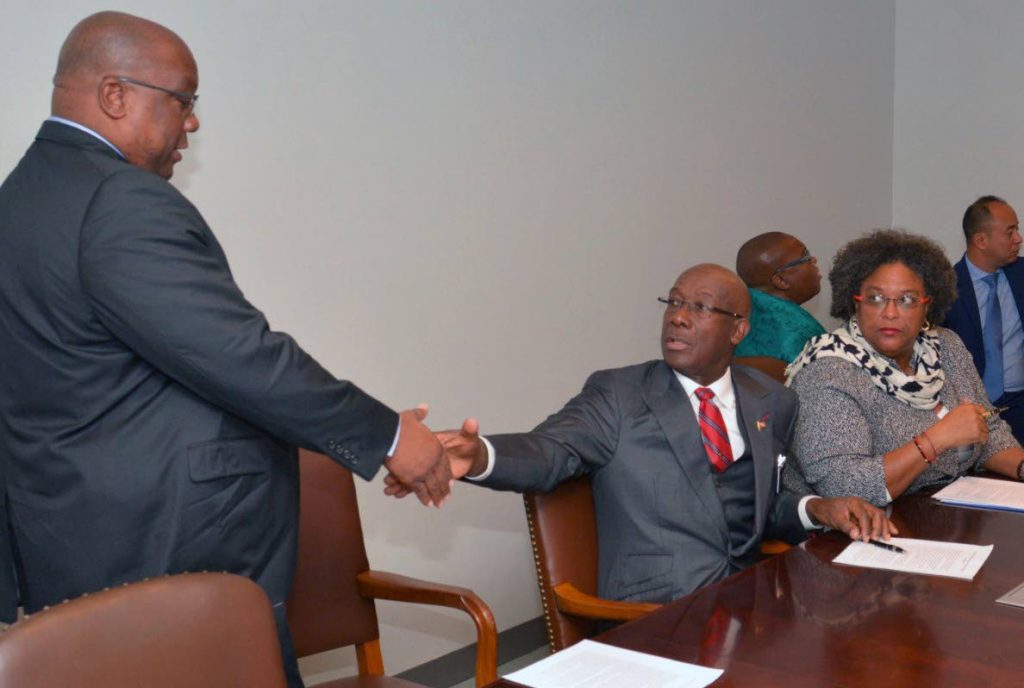PEACE POSSIBLE

PEACE and security in Venezuela and the wider region is a real possibility, following a meeting between Caricom and the United Nations (UN) yesterday to work out a strategy to lessen political tensions in that South American nation.
“(The meeting was) useful and productive. We are very satisfied that at the appropriate moment the good offices of this UN would and could bring about some significant preparation of a road map for peace and security for Venezuela and the region,” Prime Minister Dr Rowley, who was part of the Caricom delegation, said in a recorded statement posted to the Office of the Prime Minister’s official social media accounts.
The delegation, headed by Caricom chairman and St Kitts and Nevis Prime Minister Dr Timothy Harris, and including Barbados PM Mia Mottley, Rowley and Foreign Affairs Minister Dennis Moses, met with UN Secretary General Antonio Guterres in New York after Caricom requested an emergency meeting following last week’s political upheaval in Venezuela.
On Wednesday, Juan Guaido, president of the National Assembly, Venezuela’s legislature, proclaimed himself interim president of the country until fresh general elections could be called, in front a crowd of thousands of anti-government protesters.
US-backed Guaido claimed Nicolas Maduro, the incumbent, had ascended to the presidency through a fraudulent elections and as such, according to the Venezuelan Constitution, was illegitimate.
CARICOM STAYS OUT
Caricom has maintained its position of non-interference and non-intervention in the affairs of sovereign states, but in an emergency meeting on Thursday, offered to be a mediator to Venezuela, and agreed to call on the UN to assist in de-escalating tensions.
“We are very satisfied that in the coming days we could work towards that dialogue, so that the internal difficulties in Venezuela can be approached without intervention and interference from those who may have a different approach and hopefully in the not too distant future we can see significant improvement on a lessening of the tensions. We will continue to work towards peace and security in the region,” Rowley added.
Since the fall-out on Wednesday, there has been a push by the United States, especially, to get countries to support Guaido.
US Secretary of State Mike Pompeo in an address to the OAS on Thursday, made a strong call for all members of the OAS to disavow Maduro’s presidency as illegitimate, morally bankrupt, economically incompetent and corrupt, a call he echoed during an emergency UN Security Council meeting on Saturday.
The US also yesterday announced sanctions on Venezuela’s state oil company, PDVSA. PDVSA is the commercial entity currently engaging TT and Shell as partners for the monetisation of gas from Venezuela’s Dragon gas field.
The US said it would block the Maduro administration from accessing up to US$18 billion in assets, as well as any proceeds from Citgo, PDVSA’s retail chain, which will be locked away, until a democratically elected government can be put in place to reduce corruption and return these assets to the people of the country. This is the first time the US has taken a firm step to introduce direct trade sanctions.
Previously only key members of the administration and their close family members were blocked.
WORLD POWERS BRISTLE
In an email to Newsday in response to questions on this latest geopolitical quagmire, the UWI International Relations Institute said the geopolitical and economic spaces of Caricom states make them particularly vulnerable to fallouts from regional political tensions.
The question, though, is how long the Maduro administration remains and is Caricom prepared for the real possibility of impending change.
The US too, is a very important power for Caribbean countries but it is just one interested actor, so Caricom will need to consider other international actors who are important partners.
“Small states necessarily must consider their economic and political interests before pronouncing on regional political affairs. It is unlikely that Caricom is unaware of the human rights issues in Venezuela, but there are also important economic and geopolitical concerns,” the IIR said.
Most reassuringly, though, the Institute did not think war was on the horizon because military intervention by states in Venezuela will in principle, require a UN Security Council resolution, which is unlikely since a Security Council vote must be unanimous and China and Russia already have indicated their unwillingness to intervene. Regarding civil war and instability – Venezuela has been very unstable for many years now and Caribbean states have already experienced the economic and social consequences.
“It is in Caricom’s interests that a sustainable solution is found to Venezuela’s political and economic crisis. The economic projections do not seem to suggest that solutions are imminent with the Maduro regime.
“From this perspective, it appears to be in Caricom’s interest to explore more nuanced positions that prioritise the well-being of the Venezuelan people,” the institute said.


Comments
"PEACE POSSIBLE"